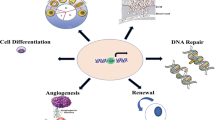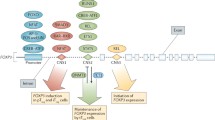Abstract.
The forkhead (Fox) gene family comprises a diverse group of ‘winged-helix’ transcription factors that play important roles in development, metabolism, cancer and aging. Recently, several forkhead genes have been demonstrated to play critical roles in lymphocyte development and effector function, including Foxp3 in the development of regulatory T cells, Foxj1 and Foxo3a in the regulation of CD4+ T cell tolerance, and Foxn1 in thymic development. Roles for other forkhead genes have also been proposed, including Foxp1 in macrophage differentiation, Foxq1 in natural killer cell effector function and Foxd2 in T cell activation. Thus, forkhead genes promise insight into the mechanisms of immunoregulation in several immune cell lineages, and their dysregulation likely contributes to the pathogenesis of several immunological disorders, suggesting that their study will lead to the development of novel therapeutic agents.
Similar content being viewed by others
Author information
Authors and Affiliations
Corresponding author
Additional information
Received 12 August 2004; received after revision 14 September 2004; accepted 28 September 2004
Rights and permissions
About this article
Cite this article
Jonsson, H., Peng, S.L. Forkhead transcription factors in immunology. CMLS, Cell. Mol. Life Sci. 62, 397–409 (2005). https://doi.org/10.1007/s00018-004-4365-8
Issue Date:
DOI: https://doi.org/10.1007/s00018-004-4365-8




